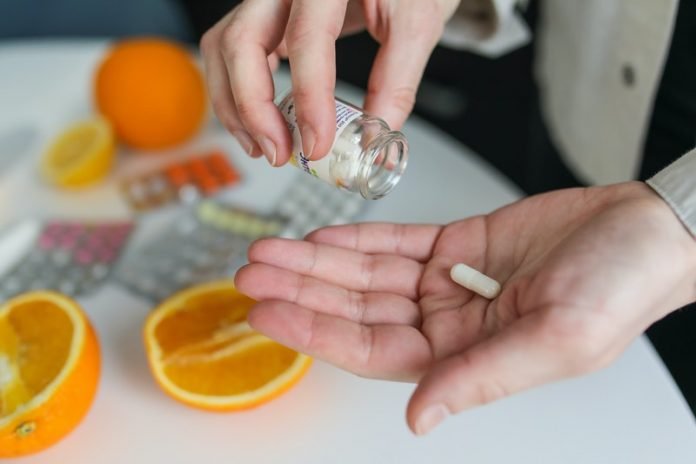
Evidence is emerging that vitamin D – and possibly vitamins K and A – might help combat COVID-19.
In a new study, researchers found how they – and other antiviral drugs – might work.
They found that these dietary supplements and compounds could bind to the viral spike protein and so might reduce SARS-CoV-2 infectivity.
The research was conducted by a team from the University of Bristol.
Recently, researchers have shown that linoleic acid binds to a specific site in the viral spike protein, and that by doing so, it locks the spike into a closed, less infective form.
In the study, the team used computational methods to search for other compounds that might have the same effect, as potential treatments.
They looked through a library of approved drugs and vitamins to identify those which might bind to this recently discovered ‘druggable pocket’ inside the SARS-CoV-2 spike protein.
They found that dexamethasone – which is an effective treatment for COVID-19 – might also bind to this site and help reduce viral infectivity in addition to its effects on the human immune system.
The team then identified some drugs that have been found by experiments to be active against the virus, suggesting that this may be one mechanism by which they prevent viral replication.
The findings suggested several drug candidates among available pharmaceuticals and dietary components, including some that have been found to slow SARS-CoV-2 reproduction in the laboratory.
These have the potential to bind to the SARS-CoV-2 spike protein and may help to prevent cell entry.
The simulations also predicted that the fat-soluble vitamins D, K, and A bind to the spike, in the same way, making the spikeless able to infect cells.
These findings help explain how some vitamins may play a more direct role in combatting COVID than their conventional support of the human immune system.
The team says obesity is a major risk factor for severe COVID. Vitamin D is fat-soluble and tends to accumulate in fatty tissue. This can lower the amount of vitamin D available to obese individuals.
Countries in which some of these vitamin deficiencies are more common have also suffered badly during the course of the pandemic.
The research suggests that some essential vitamins and fatty acids including linoleic acid may contribute to impeding the spike/ACE2 interaction.
Deficiency in any one of them may make it easier for the virus to infect.
One author of the study is Dr. Deborah Shoemark.
The study is published in the journal of the German Chemical Society Angewandte Chemie.
Copyright © 2021 Knowridge Science Report. All rights reserved.



